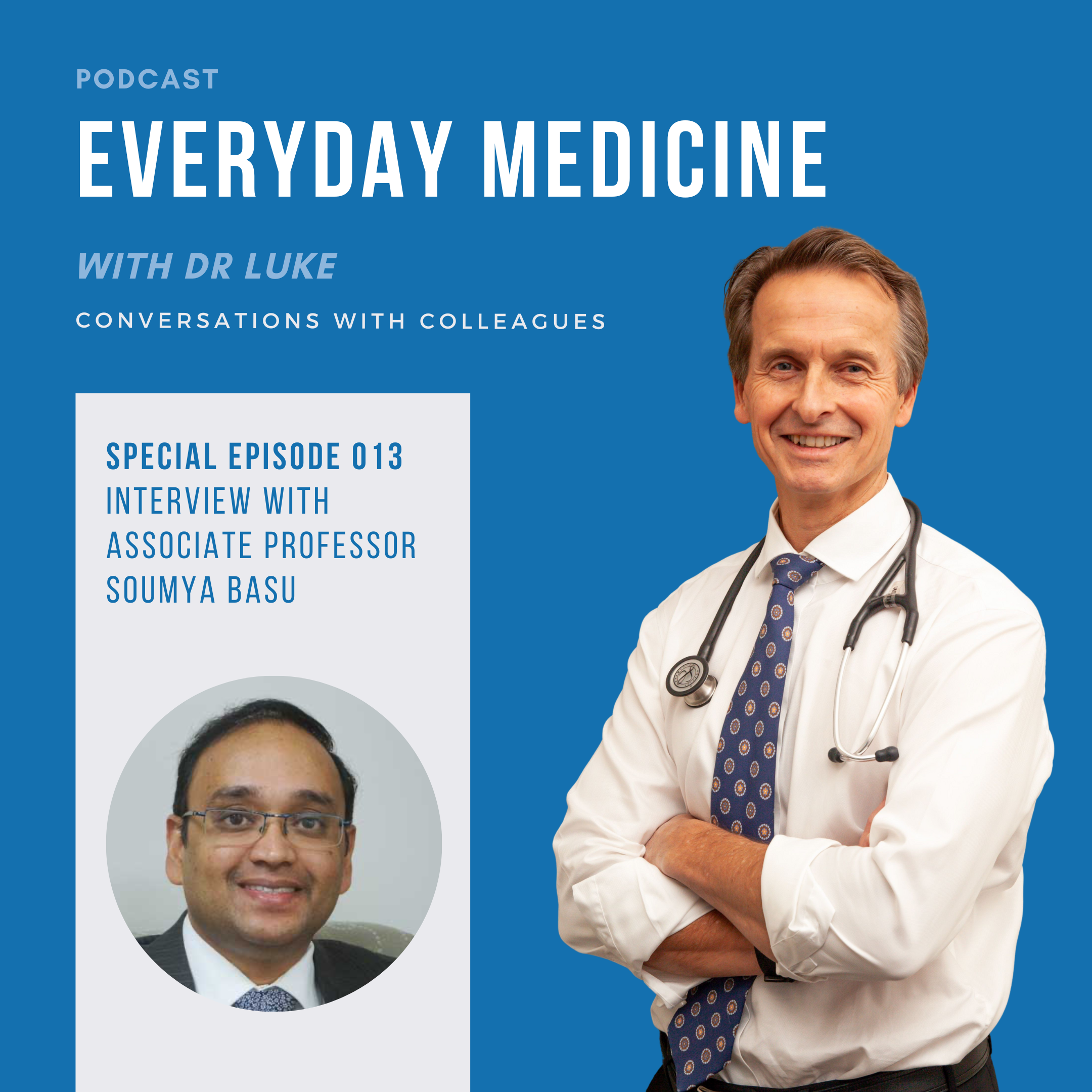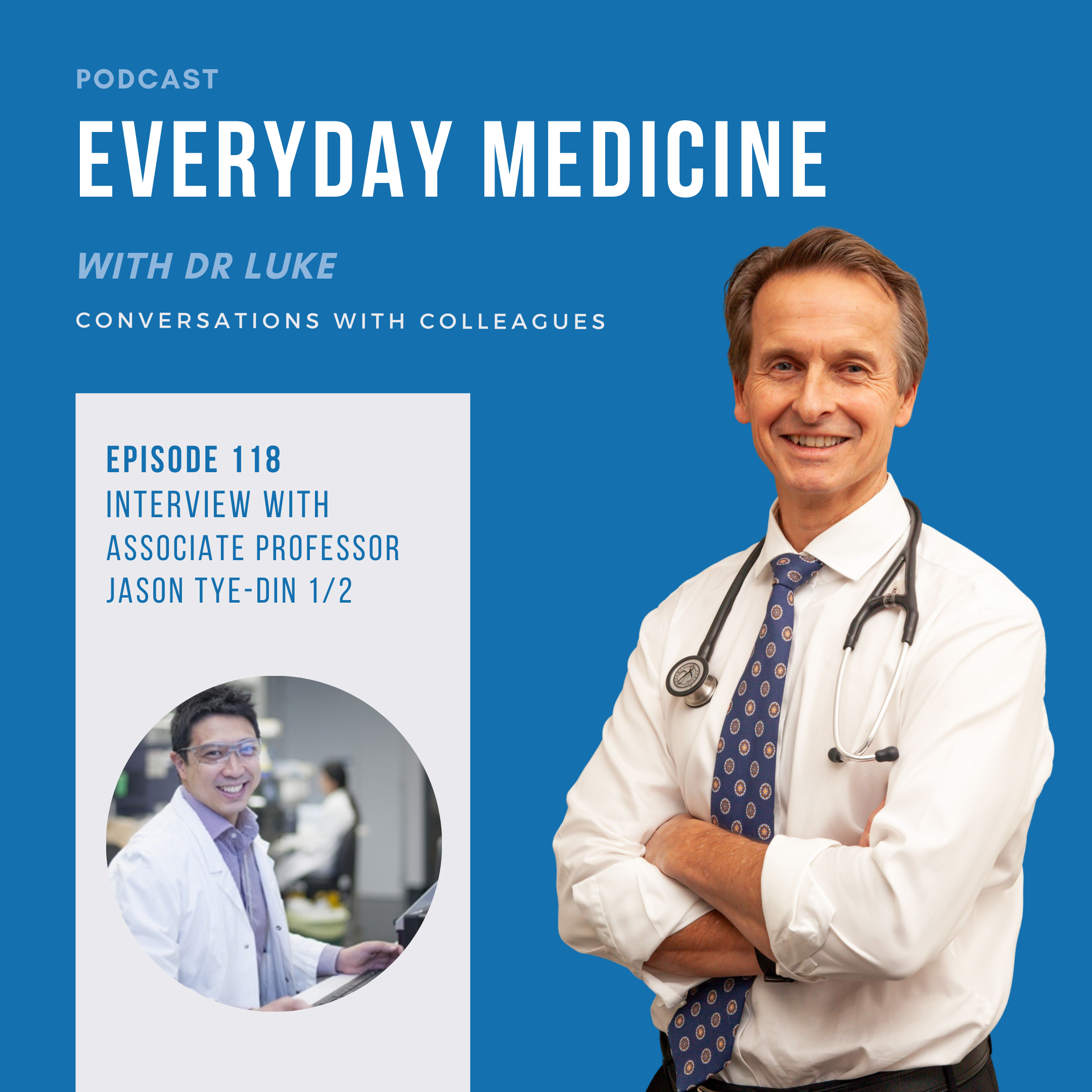Everyday Medicine by Dr Luke Crantock
Conversations with colleagues providing helpful ideas and advice in healthcare
Episode 130. Why Cancer Still Sucks with Dr David Stewart
Recently, I had the privilege of being introduced to Dr. David Stewart, Professor of Medicine at the University of Ottawa and a medical oncologist. He was kind enough to forward a copy of his excellent book, "A Short Primer on Why Cancer Still Sucks," in which he reviews various aspects of cancer medicine and raises important questions about the incidence of malignancies, treatment strategies, and the sometimes-flawed way healthcare systems and bureaucracies deliver outcomes. Ultimately, it is oncologists and primary care physicians who find themselves at the interface of providing real-time care to sick patients while navigating healthcare systems with many speed bumps.
Episode 129. Epigenetics and Pancreatic Insulin Regeneration with Dr Ishant Khurana
Recently a team from the Monash Department of Diabetes published in the Nature Journal ‘ Signal Transduction and Targeted Therapy ‘ how their research could lead to the regeneration of insulin in pancreatic stem cells. As their findings could potentially benefit the 130,000 Type I diabetics in Australia and 30 per cent of Type II diabetics who are insulin dependent it received significant media attention. Diabetes is the fastest-growing illness in Australia and about 500 million people have diabetes worldwide with the potential complications of cardiovascular disease, renal failure, cerebrovascular disease, neuropathy, retinopathy, and lower limb amputation.
Associate Professor Neale Cohen who is the director of diabetes clinical research at the Baker Heart and diabetes institute believes the research shows great potential. Currently, the research is being conducted by a carefully selected team lead by Professor Sam El-Osta and including Dr Ishant Khurana and Dr Al-Hasani and we will be discussing their work and objectives further with Ishant in this podcast.
The research has discovered how to reawaken stem-like cells in the diabetic pancreas. Using an inhibitor of the protein called EZH2 which induces histone H3 lysine 27 trimethylation that functions to silence the insulin gene, insulin expression may be reawakened. If successful, the research will not only lead to a method for avoiding islet cell transplantation but possibly the need for exogenous insulin therapy altogether which is very exciting.
I was curious to have this research explained in more detail and to discover how close the investigative team were to success using these groundbreaking epigenetic strategies.
Please join me in welcoming Dr Ishant Khurana to the podcast.
References:
Dr Ishant Khurana: https ://research.monash.edu
Twitter: https://twitter.com/IshantKhuranaAU
Nature journal, Signal Transduction and Targeted Therapy titled: Inhibition of pancreatic EZH2 restores progenitor insulin in T1D donor. DOI: 10.1038/s41392-022-01034-7
Episode 128. Chronic Leukaemia with Jake Shortt
Leukemias are malignant progressive disease in which the bone marrow and other blood-forming organs produce increased numbers of immature or abnormal leucocytes. This is thought to occur after somatically acquired genetic mutations lead to dysregulation and clonal expansion of progenitor cells. Whilst most leukemias involve white blood cells, occasionally other cells are the primary leukemia cells such as red blood cells or platelets.
As disease progression occurs, suppression of normal blood cell production leads to anemia and cytopenia with a host of attendant symptoms and clinical consequences.
Episode 127. Acute Leukaemia with Jake Shortt
Leukemias are malignant progressive disease in which the bone marrow and other blood-forming organs produce increased numbers of immature or abnormal leucocytes. This is thought to occur after somatically acquired genetic mutations lead to dysregulation and clonal expansion of progenitor cells. Whilst most leukemias involve white blood cells, occasionally other cells are the primary leukemia cells such as red blood cells or platelets.
As disease progression occurs, suppression of normal blood cell production leads to anemia and cytopenia with a host of attendant symptoms and clinical consequences.
There are 14 new diagnoses of Leukaemia per day in Australia accounting for about 5200 diagnoses yearly and making up about 3.2 % of all new cancer diagnoses per year. Leukaemia is responsible for over 2100 deaths annually. Men are slightly more likely to be affected in a 60: 40 split with women. By the age of 85 years, one has a 1: 50 chance of this diagnosis. With current treatment approaches overall 5-year survival sits at about 64 % but this figure is influenced by the subtype of Leukaemia diagnosed with aggressive forms of Leukaemia such as AML carrying a much worse prognosis than a diagnosis such as CLL which may run an indolent course for many years.
Dividing adult Leukaemia into acute and chronic classification is most helpful and this podcast will approach the topic similarly over two episodes.
The acute Leukaemias encompass acute myeloid leukemia (30 % of adult Leukaemia), acute lymphoblastic Leukaemia and Leukaemia's of ambiguous origin.
The chronic Leukaemias include Chronic Myeloid Leukaemia (CML) and Chronic lymphocytic leukemia (CLL)
This is another vast subject, and it was a real honour to invite Professor Jake Shortt to the podcast. Jake is the Head of Haematology Research at the School of Clinical Sciences and clinical lead at Monash Haematology for Myeloid Leukaemia, myelodysplasia and T-cell lymphoma. He is the Principal Investigator on a range of clinical trials for T-cell lymphoma and myeloid malignancies, conducted through the Monash Haematology clinical trials unit and the recipient of a Medical Research Future Fund Career Development Fellowship. His work in the School of Clinical Sciences is focused on strategies incorporating epigenetic drugs with immunotherapy in haematological cancers, particularly Lymphoma and Multiple Myeloma. Jake heads the Blood Cancer Therapeutics laboratory within the Monash Health Translation Precinct and somehow also finds the time to be Chair of the Laboratory Sciences Working Party of the Australasian Leukaemia and Lymphoma Group (ALLG) and Deputy Chair of their Scientific Advisory Committee.
Please welcome Professor Jake Shortt to the podcast.
References :
Haematology and Oncology Subspecialty Consult, 4th Ed, Cashen and Van Tine, Wolters Kluwer, Ch 31
www.leukaemia.org.au
www.cancer.org.au
www.monashhealth.org/services/haematology/jake-shortt/
Episode 124. Lipids and Atherosclerotic Cardiovascular Disease with Dr Brett Forge (Part 3/3)
Lipids are essential for cell function and healthy metabolism however clinical analysis of a patient’s lipid profile also addresses one of the fundamental drivers of atherosclerotic cardiovascular disease responsible for 25 % of all deaths in Australia. Modification of abnormal serum lipid levels by lifestyle and pharmacologic intervention aims to achieve a healthy coronary circulation reducing new atheroma formation and stabilizing preexisting atheromatous plaques.




















